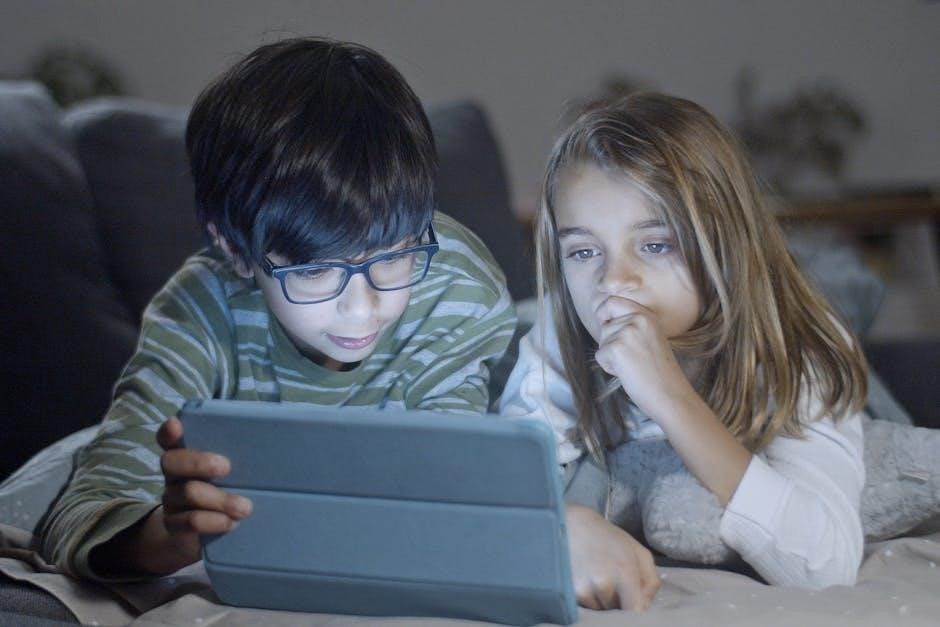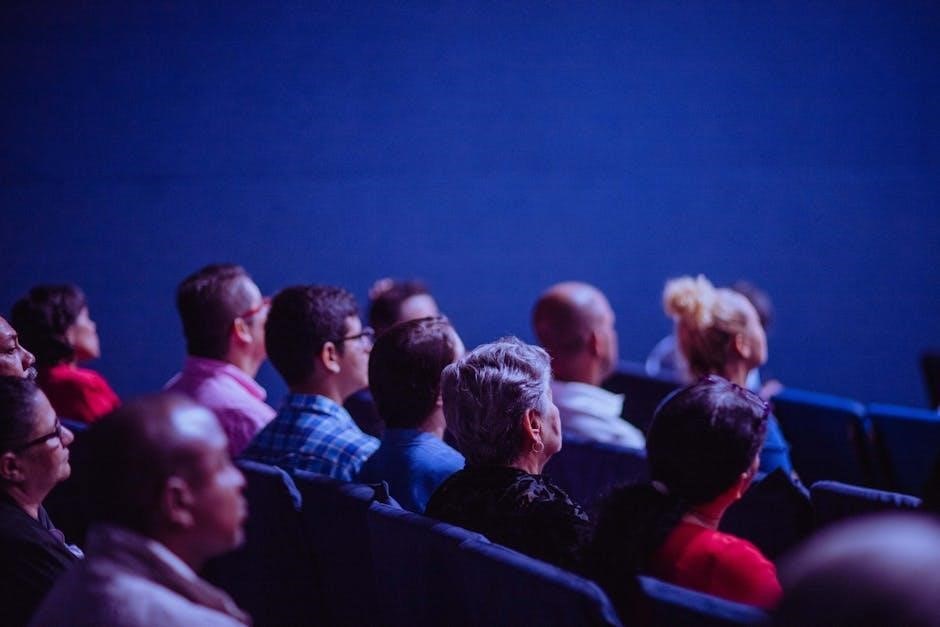
Albert Bandura’s Social Learning Theory explains how individuals acquire behaviors by observing and imitating others, emphasizing cognitive processes and environmental influences. It highlights the role of observation, imitation, and reinforcement in learning, providing a comprehensive framework for understanding human behavior development.
Overview of Social Learning Theory
Social Learning Theory, developed by Albert Bandura, provides a framework for understanding how behaviors are acquired through observation and imitation. It emphasizes the role of cognitive processes, such as attention, memory, and reinforcement, in learning. Unlike traditional behaviorist theories, Bandura’s approach highlights the importance of observing others, modeling behaviors, and the interaction between personal factors and environmental influences. This theory explains how individuals learn new behaviors by watching models and imitating their actions, making it a cornerstone of cognitive-behavioral psychology.
Key Concepts and Principles
Bandura’s Social Learning Theory centers on key concepts like observational learning, where individuals acquire behaviors by observing models. Self-efficacy, the belief in one’s ability to succeed, influences behavior. Reciprocal determinism explains the interaction between personal factors, behavior, and environment. These principles emphasize cognitive processes and the role of reinforcement in learning, offering a comprehensive understanding of how behaviors develop and change through observation and interaction with the environment.
Historical Context and Development
Bandura’s Social Learning Theory emerged in the mid-20th century, challenging behaviorist views by emphasizing cognitive processes and social influences. Developed in the 1950s and 1960s, it evolved from Bandura’s early research on aggression and observational learning. His Bobo Doll experiments demonstrated how behaviors are acquired through observation and imitation. The theory expanded to include self-efficacy and reciprocal determinism, providing a comprehensive framework for understanding behavior development. Bandura’s work marked a significant shift in psychology, integrating cognitive and environmental factors into learning theories.

Albert Bandura’s Biography and Contributions
Albert Bandura, a Canadian-American psychologist, developed Social Learning Theory, emphasizing observation and imitation. His work on aggression and self-efficacy revolutionized psychology, influencing education and behavior change.
Early Life and Education
Albert Bandura was born on December 4, 1925, in Mundare, Alberta, Canada. He grew up in a small community with limited educational resources, fostering his strong academic drive. Bandura’s interest in psychology emerged during his undergraduate studies. He later moved to the U.S., earning his Ph.D. in psychology from the University of Iowa in 1952. His early experiences and education laid the foundation for his groundbreaking work in psychology and learning theories.
Academic Career and Major Works
Albert Bandura’s academic career spanned over six decades. He joined Stanford University, becoming the David Starr Jordan Professor of Social Science in Psychology. His major works include Principles of Behavior Modification (1969), Psychological Modeling (1971), and Social Foundations of Thought and Action (1986). These works laid the groundwork for Social Learning Theory and Social Cognitive Theory, revolutionizing understanding of human behavior and learning processes.
Awards and Legacy
Albert Bandura received numerous accolades for his contributions to psychology. He was awarded the National Medal of Science in 2016 and the Order of Canada in 2015. Bandura was one of the most frequently cited psychologists, reflecting his profound impact on the field. His work on social learning theory and self-efficacy continues to influence education, mental health, and social policies worldwide, leaving a lasting legacy in understanding human behavior and learning processes.

Core Concepts of Social Learning Theory
Social Learning Theory focuses on observational learning, self-efficacy, and reciprocal determinism, emphasizing how behavior is shaped by observing others, personal beliefs, and environmental interactions.
Observational Learning and Modeling
Observational learning, a cornerstone of Bandura’s theory, occurs when individuals acquire behaviors by watching and imitating models. The famous Bobo doll experiment demonstrated that children learn aggressive behaviors by observing adults, even without direct reinforcement. This process involves attention, retention, reproduction, and motivation, showing how observing others shapes behavior. Bandura’s work challenged behaviorist views, emphasizing cognitive processes and the role of modeling in learning, proving that behavior can be acquired through observation alone, influencing both positive and negative actions.
Self-Efficacy and Its Role in Behavior
Self-efficacy, a concept introduced by Bandura, refers to an individual’s belief in their ability to succeed in specific situations. It significantly influences behavior, motivation, and persistence, shaping how people approach challenges. High self-efficacy fosters resilience and adaptability, while low self-efficacy can lead to avoidance of tasks. Bandura emphasized that self-efficacy develops through experiences, observations, and social interactions, playing a crucial role in determining behavioral outcomes and personal growth.
Reciprocal Determinism
Reciprocal determinism, a core concept in Bandura’s theory, describes the dynamic interaction between behavior, personal factors, and environmental influences. It posits that behavior is shaped by personal traits and external environments, while also influencing them in return. This bidirectional relationship emphasizes the interdependence of cognitive, emotional, and situational elements. Bandura argued that behavior is not solely determined by external rewards or punishments but is a result of this continuous, reciprocal process, highlighting the complexity of human learning and adaptation.

Mediational Processes in Learning
Mediational processes in learning involve cognitive factors like attention, retention, and reinforcement, which mediate the observation and imitation of behaviors, connecting them to actual performance.
Attention and Its Importance
Attention is a critical mediational process in Bandura’s Social Learning Theory, as it determines what individuals focus on and observe. People cannot learn by observing behaviors they do not attend to. Attention is selective, influenced by factors like novelty, relevance, and emotional arousal. Bandura emphasized that for learning to occur, observers must actively engage with and process the information they observe. Without attention, even the most salient behaviors may go unnoticed, limiting the potential for imitation and learning.
Retention and Motor Reproduction
Retention refers to the process of storing observed behaviors in memory, enabling individuals to recall and reproduce them later. Bandura emphasized that learning requires not only observation but also the ability to remember what was observed. Cognitive processes like mental rehearsal and coding play a crucial role in retention, ensuring that behaviors are stored accurately for future use.
Motor reproduction involves the physical ability to perform the observed behavior. It requires practice and opportunity to replicate the action accurately. Bandura stressed that retention alone is insufficient without the capability to execute the behavior, making motor reproduction a critical step in the learning process.
Reinforcement and Motivation
Reinforcement plays a critical role in Bandura’s Social Learning Theory, as it determines whether observed behaviors are repeated; Positive reinforcement increases the likelihood of imitating a behavior, while punishment or lack of reward discourages it. Bandura expanded on traditional behaviorist views by emphasizing that reinforcement is not the sole driver of learning but interacts with cognitive processes like expectation and self-efficacy.
Motivation is central to the learning process, as individuals are more likely to imitate behaviors they perceive as rewarding or beneficial. Bandura’s theory highlights that internal factors, such as personal satisfaction, and external rewards collectively shape behavior, making reinforcement a key motivator in social learning.

The Bobo Doll Experiment
Bandura’s Bobo Doll Experiment demonstrated that children learn aggressive behavior by observing and imitating adults, highlighting the power of observational learning in shaping actions.
Design and Objective of the Experiment
The Bobo Doll Experiment was designed to test if children would imitate aggressive behavior observed in adult models. Bandura placed children in a room with an adult who either acted aggressively or neutrally toward a Bobo doll. The children were then given toys, including the doll, to play with. The objective was to observe if exposure to aggressive behavior would lead to imitation, providing evidence for social learning theory’s validity in explaining behavioral acquisition through observation and modeling.
Key Findings and Implications
The Bobo Doll Experiment revealed that children exposed to aggressive adult models were more likely to exhibit violent behavior toward the doll. This demonstrated that aggression can be learned through observation and imitation. The findings underscored the role of environmental influences and observational learning in shaping behavior. Bandura’s results challenged traditional behaviorist views, emphasizing cognitive processes and the importance of modeling in learning. These insights have profound implications for understanding aggression, education, and the impact of media on behavior, influencing strategies for behavioral change and prevention of violence.
Criticism and Ethical Considerations
Bandura’s Social Learning Theory has faced criticism for its reliance on laboratory experiments, such as the Bobo Doll Study, which some argue lack real-world applicability. Ethical concerns arise regarding the exposure of children to aggressive models, raising questions about the morality of inducing harmful behavior for research. Critics also suggest the theory may oversimplify complex behaviors by focusing too narrowly on observation and imitation, potentially overlooking biological and individual differences in learning processes.
Applications of Social Learning Theory
Social Learning Theory is widely applied in education, therapy, and aggression prevention, emphasizing observational learning and modeling to drive behavioral change and improve mental health outcomes effectively.
Education and Behavioral Change
Social Learning Theory significantly influences education by emphasizing observational learning and modeling. Educators use demonstrations and feedback to teach new behaviors, fostering skill acquisition. Bandura’s concept of self-efficacy encourages students to believe in their abilities, enhancing motivation. The theory also highlights the role of reinforcement in shaping behaviors, promoting positive change. By applying these principles, educational settings can effectively encourage learning and behavioral development, making it a powerful tool for educators to inspire and guide students.
Therapy and Mental Health
Social Learning Theory is widely applied in therapy to address mental health issues. Therapists use modeling techniques to demonstrate adaptive behaviors, helping clients observe and imitate positive actions. Bandura’s concept of self-efficacy is crucial, as it empowers individuals to believe in their ability to change. Techniques like role-playing and reinforcement are employed to replace maladaptive behaviors with healthier ones. This approach fosters a collaborative environment, enabling individuals to acquire coping strategies and improve their mental well-being through observation and practice.
Aggression and Violence Prevention
Bandura’s Social Learning Theory provides insights into aggression and violence prevention. Observing aggressive models can lead to imitative behavior, highlighting the need to reduce exposure to violent examples. Interventions focus on modeling non-aggressive behaviors, reinforcing positive actions, and teaching empathy. By addressing environmental factors and promoting self-efficacy, individuals can learn to regulate their emotions and adopt peaceful conflict-resolution strategies. This approach aims to break cycles of violence by fostering healthier behavioral patterns and societal norms, ultimately reducing aggression in individuals and communities.

Criticisms and Debates
Bandura’s Social Learning Theory has faced criticism for its focus on observational learning, with some arguing it overlooks biological and internal factors. Ethical concerns arise from the Bobo doll experiment, and debates compare it to other theories like behaviorism, questioning its comprehensiveness in explaining all learning processes.
Challenges to Bandura’s Theory
Bandura’s theory has faced challenges regarding its reliance on observational learning, with critics arguing it may overlook biological and internal factors. Some question its applicability across diverse cultures and contexts. Additionally, the theory’s emphasis on external behaviors has led to debates about neglecting unconscious motivations. Ethical concerns, particularly from the Bobo doll experiment, have also sparked criticism, with some arguing it oversimplifies complex behaviors. These challenges highlight the need for a more holistic understanding of learning processes.
Comparisons with Other Learning Theories
Bandura’s Social Learning Theory differs from behaviorist theories by emphasizing cognitive processes and observation. Unlike Skinner’s operant conditioning, which focuses solely on rewards and punishments, Bandura incorporates mental processes like attention and retention. His theory also contrasts with purely cognitive theories by highlighting the role of environmental factors. While behaviorism views learning as passive, Bandura’s approach is interactive, emphasizing the reciprocal relationship between individuals and their environment. This unique blend of cognitive and environmental influences sets his theory apart from other learning frameworks.
Evolution of the Theory Over Time
Bandura’s Social Learning Theory evolved significantly over the years, expanding its scope and complexity. Initially focusing on observation and imitation, it later incorporated cognitive elements like self-efficacy and reciprocal determinism. Bandura renamed it Social Cognitive Theory in 1986, emphasizing the interplay between personal, behavioral, and environmental factors. This evolution reflected advances in psychological research and Bandura’s growing interest in cognitive processes, making the theory more comprehensive and applicable to diverse contexts, including education, mental health, and social change.

Empirical Evidence and Research
Bandura’s Social Learning Theory is supported by extensive empirical research, including his notable Bobo Doll experiment, demonstrating how observation and imitation shape behavior, influencing psychology and education.
Supporting Studies and Experiments
Bandura’s Social Learning Theory is backed by numerous studies, most notably the Bobo Doll experiment, which demonstrated that children learn aggressive behaviors by observing and imitating adults. This experiment provided strong evidence for the role of observation and imitation in behavior acquisition. Additionally, other studies have shown how modeling influences behavior in various contexts, reinforcing the theory’s validity across different scenarios and populations.
Controversies in Research Findings
Bandura’s Social Learning Theory has faced criticism for oversimplifying human behavior and not adequately addressing internal cognitive processes. Critics argue that the theory places too much emphasis on observational learning, potentially neglecting biological and environmental factors. Additionally, some researchers have questioned the ecological validity of the Bobo Doll experiment, suggesting it may not fully capture real-world aggression. Despite these controversies, the theory remains influential in understanding behavioral acquisition and change.
Modern Applications of the Theory
Bandura’s Social Learning Theory continues to influence modern fields like education, media, and public health. It is used to design effective behavioral change campaigns, such as anti-smoking or safe-driving programs. The theory also informs the development of educational technologies and virtual learning environments. Additionally, it guides strategies for reducing aggression and promoting prosocial behaviors in digital spaces. Its principles are increasingly applied in mental health interventions, demonstrating its enduring relevance in addressing contemporary challenges.
The Role of Environment in Learning
Bandura’s Social Learning Theory emphasizes the environment’s role in shaping behavior through observation and reinforcement. Environmental factors provide models and consequences that influence behavior adoption.
Environmental Factors and Behavior
Environmental factors significantly influence behavior through observational learning and reinforcement. Social models in the environment demonstrate behaviors, while rewards or punishments shape behavior adoption. Bandura’s theory highlights how environmental cues and reinforcement can either encourage or discourage specific actions, emphasizing the dynamic interplay between an individual’s behavior and their surroundings. This reciprocal relationship underscores the importance of understanding how environmental contexts shape learning and behavior patterns over time.
Interaction Between Person and Environment
Bandura’s theory emphasizes reciprocal determinism, where behavior, personal factors, and the environment interact bidirectionally. Individuals influence their environment through their actions, while environmental factors shape behavior. This dynamic interaction highlights how people actively construct their learning experiences by selecting or modifying their surroundings. The interplay between personal agency and environmental influences underscores the complexity of behavior development, as individuals are not passive recipients but active participants in their own learning processes.
Implications for Social Change
Bandura’s Social Learning Theory highlights the potential for observation and modeling to drive positive social change. By promoting prosocial behaviors and challenging harmful norms, individuals can inspire others to adopt similar practices. The theory underscores the role of collective efficacy, where communities believe in their ability to effect change, fostering societal transformation. This framework provides practical strategies for addressing issues like aggression, discrimination, and environmental degradation, emphasizing the power of observable actions to reshape cultural and societal behaviors.

Bandura’s Social Cognitive Theory

Bandura’s Social Cognitive Theory expands on Social Learning Theory, emphasizing cognition and the triadic reciprocal causation between person, behavior, and environment, shaping behavior through observation and self-efficacy.
Evolution from Social Learning Theory
Bandura’s Social Cognitive Theory evolved from his earlier Social Learning Theory, incorporating cognitive processes and emphasizing the reciprocal interaction between individuals and their environment. It introduced the concept of self-efficacy, highlighting how individuals’ beliefs in their abilities influence behavior. The theory also expanded on observational learning, stressing the role of cognitive processes like attention, retention, and motor reproduction. This evolution provided a more comprehensive understanding of how behavior is shaped by the interplay of personal, environmental, and behavioral factors.
New Concepts and Frameworks
Bandura’s Social Cognitive Theory introduced new concepts like self-efficacy, the belief in one’s ability to succeed, and reciprocal determinism, which emphasizes the interaction between behavior, environment, and personal factors. It also refined observational learning, distinguishing between learning by observing and imitating models. These frameworks expanded understanding of human behavior, highlighting cognitive processes and the role of self-regulation, and provided a broader, more dynamic view of learning and behavior compared to earlier theories.
Integration with Other Theories
Bandura’s Social Learning Theory integrates with cognitive theories by emphasizing self-efficacy and observational learning. It aligns with behavioral theories by incorporating reinforcement and punishment, bridging cognitive and behavioral perspectives. The theory also complements educational and psychological frameworks, offering a holistic understanding of behavior and learning. By combining these elements, Bandura’s theory provides a versatile approach to understanding human behavior, making it widely applicable in various fields, from education to mental health, and enhancing its relevance in modern psychological research and practice.

Practical Implications and Uses
Bandura’s Social Learning Theory has practical implications in education, therapy, and behavioral change, utilizing modeling techniques to influence behavior. It also impacts media, policy, and real-world applications effectively.
Influence on Psychology and Education
Bandura’s Social Learning Theory revolutionized psychology and education by emphasizing observation and imitation. It transformed teaching methods, encouraging the use of models and demonstrations to enhance learning. In psychology, it provided new insights into behavioral development, highlighting the role of cognitive processes and environmental interactions. Educators adopted these principles to design effective instructional strategies, fostering engagement and skill acquisition. The theory’s emphasis on self-efficacy further empowered learners, making it a cornerstone of modern educational and psychological practices.
Applications in Media and Technology
Bandura’s Social Learning Theory has been widely applied in media and technology to shape behaviors and attitudes. Media campaigns often use modeling to promote positive behaviors, such as health campaigns featuring individuals exercising. Video games incorporate observational learning, allowing players to imitate virtual models. Additionally, technology enhances learning through interactive platforms that provide reinforcement and feedback, fostering skill development. The theory’s principles are also used in educational software to create engaging, model-based learning experiences, demonstrating its versatility in modern applications.
Impact on Social Policies
Bandura’s Social Learning Theory has significantly influenced social policies by providing frameworks for behavior change and community development. Policies addressing aggression and violence prevention often incorporate observational learning principles to model positive behaviors. Educational campaigns use modeling to promote health and safety practices. The theory’s emphasis on self-efficacy has shaped interventions aimed at empowering individuals and communities. By integrating cognitive and environmental factors, it informs policies that foster resilience and reduce societal issues, demonstrating its practical relevance in addressing complex social challenges.
Bandura’s Social Learning Theory remains a cornerstone in psychology, shaping understanding of human behavior and learning. Future research will explore its applications in emerging fields like digital media and neuroscience, ensuring its enduring relevance in addressing complex societal challenges.
Bandura’s Social Learning Theory posits that behavior is acquired through observation and imitation, influenced by cognitive processes and environmental factors. Key concepts include observational learning, self-efficacy, and reciprocal determinism. The theory emphasizes the role of models, reinforcement, and personal factors in shaping behavior. Bandura’s work, notably the Bobo doll experiment, demonstrated how aggression can be learned through observation. His theory has evolved into social cognitive theory, emphasizing the interaction between person, environment, and behavior. It remains influential in psychology, education, and behavior change, highlighting the dynamic nature of learning and behavior development.
Future Research and Applications
Future research on Bandura’s Social Learning Theory could explore its integration with emerging technologies like AI and virtual reality to enhance behavioral modeling. Applications in education and mental health could benefit from personalized learning tools based on social cognitive principles. Additionally, the theory’s emphasis on observational learning could be leveraged to address global health challenges and promote prosocial behaviors. Continued study of self-efficacy and reciprocal determinism will further refine interventions aimed at fostering positive behavioral change and societal well-being.
Bandura’s Enduring Influence
Albert Bandura’s work remains a cornerstone of psychology, shaping understanding of human behavior and learning. His Social Learning Theory and Social Cognitive Theory continue to inspire research and applications across education, mental health, and social change. Bandura’s legacy endures through his groundbreaking studies, such as the Bobo Doll experiment, and his emphasis on self-efficacy. His contributions have earned him numerous accolades, including the National Medal of Science, solidifying his impact on psychology and beyond.